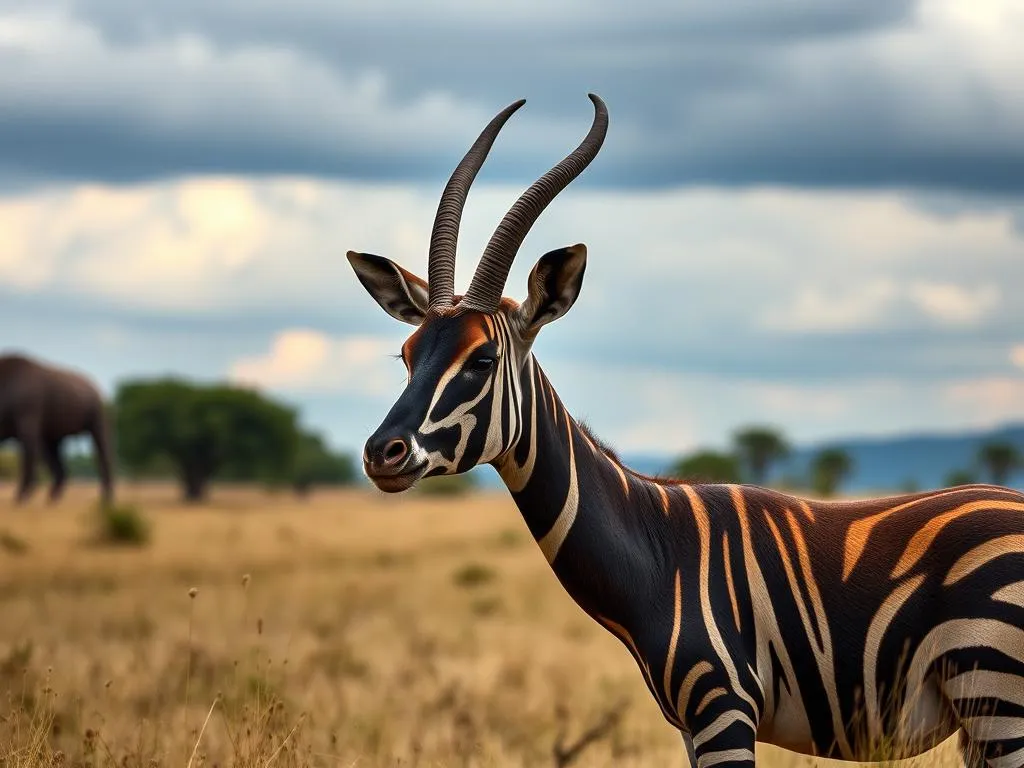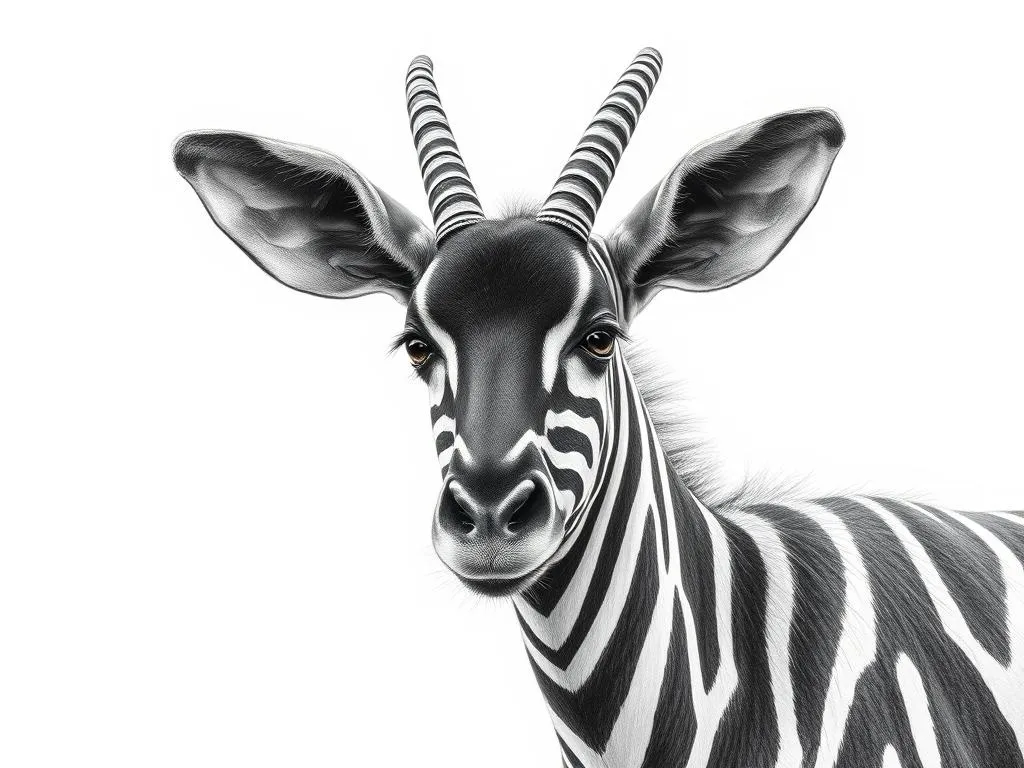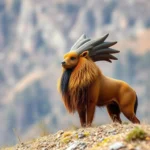The Enigmatic Okapi: A Symbol of Mystique and Grace

Disclaimer: Some images on this website are AI-generated artworks and may not accurately represent real animals.
The okapi, often referred to as the “forest giraffe,” is a creature that embodies both beauty and enigma. With its striking appearance and elusive nature, the okapi serves as a powerful symbol of mystique and grace in various cultures. This article delves into the symbolism and meaning of the okapi, revealing its significance in our lives and the natural world.
Understanding the Okapi
Overview of the Okapi
Native to the dense rainforests of the Democratic Republic of the Congo, the okapi (Okapia johnstoni) is a unique mammal that captivates the imagination. With its long neck, zebra-like stripes on its legs, and a body resembling that of a horse, the okapi is truly a sight to behold. It stands about 4 to 5 feet tall at the shoulder and can weigh between 440 to 770 pounds.
| Physical Characteristics | Value |
|---|---|
| Height | 4 to 5 feet |
| Weight | 440 to 770 pounds |
| Lifespan | 20 to 30 years |
| Habitat | Rainforests of Congo |
| Diet | Herbivorous (leaves, fruits, and flowers) |
The okapi primarily resides in the Ituri Forest, where it thrives in a habitat rich in foliage. Its diet consists mainly of leaves, fruits, and flowers, which it forages for in the understory of the forest. The okapi’s unique adaptations, such as its long tongue (which can reach up to 12 inches), allow it to grasp and pull leaves from high branches.
Cousin of the Giraffe
Despite its resemblance to a zebra, the okapi is closely related to the giraffe. Both species belong to the Giraffidae family, which is characterized by their elongated necks and unique body structure. While giraffes are known for their towering heights and open savannah habitats, the okapi has adapted to life in the dense forests, showcasing the incredible diversity within the family.
This relationship highlights the adaptability of these creatures. While giraffes are exposed to the vastness of the African plains, okapis have evolved to navigate the complex and often impenetrable rainforest environment, utilizing their stunning camouflage to evade predators.
Cultural Significance
The okapi holds a special place in various cultures, particularly among the indigenous peoples of the Congo. In some communities, the okapi is viewed as a symbol of grace and beauty, often appearing in folklore and traditional stories. Its elusive nature has made it a subject of intrigue, with tales of the okapi’s mystical qualities permeating local culture.
Historically, the okapi was unknown to the western world until the early 20th century when it was first described by scientists. This sense of mystery surrounding the okapi has only added to its allure, making it a powerful symbol of the unknown and the beauty of discovery.

Symbolism & Spiritual Meaning
Dual Nature
The okapi embodies a dual nature, representing a balance between the wild and the domesticated. In many spiritual traditions, animals that exhibit such duality are seen as symbols of harmony. The okapi’s ability to thrive in the wild while displaying gentle, graceful characteristics signifies a balance that many strive for in their own lives.
This duality can serve as a reminder to embrace both our wild instincts and our cultivated traits. It encourages us to find equilibrium, allowing us to navigate the complexities of our existence with grace and poise.
Camouflage and Adaptability
The okapi’s striking appearance is complemented by its remarkable ability to blend into its surroundings. Its dark skin and striped legs provide effective camouflage against the dappled light of the forest, allowing it to remain hidden from predators. This adaptability is a powerful metaphor for our own lives.
In a world that often demands conformity, the okapi teaches us the importance of adaptability. It symbolizes the ability to adjust to changes and challenges while remaining true to oneself. The okapi’s symbolism and meaning encourage us to embrace our individuality, even in the face of adversity.
Mystery and Discovery
The okapi is often associated with mystery and the thrill of discovery. As a creature that was once thought to be a myth, the okapi represents the beauty of the unknown. It serves as a reminder that there is still much to explore and understand in the world.
This symbolism can inspire a sense of curiosity and wonder, urging us to seek out new experiences and knowledge. The okapi encourages us to embrace the mysteries of life, reminding us that growth often comes from stepping into the unknown.
Okapi in Dreams
Interpreting Okapi Dreams
Dreams featuring the okapi can carry significant meanings. When the okapi appears in our dreams, it may symbolize a journey of self-discovery or the exploration of our hidden talents. The unique characteristics of the okapi can reflect qualities we possess but may not fully recognize.
Possible Interpretations of Okapi Dreams
| Dream Element | Interpretation |
|---|---|
| Seeing an okapi | Discovery of hidden talents or qualities |
| Riding an okapi | Embracing your dual nature |
| An okapi in distress | A call to protect your inner self |
| Playing with an okapi | A reminder to connect with your playful side |
Dreaming of an okapi might encourage us to explore our own abilities and the aspects of our personality that we have yet to uncover. It invites us to embark on a journey of self-exploration, helping us to grow and evolve.
Symbol of Transformation
The okapi can also signify personal transformation. Its elusive nature and adaptability highlight the potential for change in our lives. Just as the okapi navigates its forest environment, we too can navigate our personal landscapes, adapting and transforming as we go.
When the okapi appears in our dreams, it may indicate that we are on the brink of a significant transformation. This can be a powerful reminder to embrace change, as it often leads to growth and new opportunities.
Messages of Intuition
The okapi is often seen as a guide to trusting one’s instincts. Its ability to navigate the dense forest serves as a metaphor for the importance of listening to our inner voice. When the okapi appears in dreams, it can encourage us to rely on our intuition, guiding us toward the right path.
This symbolism can be particularly powerful during times of uncertainty. The okapi reminds us that, much like its natural habitat, life can be complex and multifaceted. Trusting our instincts can help us make sense of our surroundings, leading us toward clarity and understanding.
Modern Interpretations
Conservation and Protection
In recent years, the okapi has become a symbol for wildlife conservation and environmental awareness. As a species that is endangered due to habitat loss and poaching, the okapi serves as a reminder of the importance of protecting our natural world. Its plight highlights the broader issues facing many species and ecosystems.
Organizations dedicated to the conservation of the okapi advocate for sustainable practices and the preservation of its natural habitat. By recognizing the okapi’s significance, we can foster a greater appreciation for biodiversity and the need to protect our planet.
Cultural Representations
The okapi has made its mark in various forms of art, literature, and popular culture. From illustrations in children’s books to appearances in documentaries, the okapi continues to inspire creativity and curiosity. Its unique appearance and mysterious nature make it a captivating subject for artists and storytellers alike.
In literature, the okapi often symbolizes beauty, grace, and the allure of the unknown. Its representation in popular culture serves to educate people about this remarkable creature, promoting awareness about wildlife conservation.
Personal Spirit Animal
For some, the okapi may serve as a personal spirit animal. Those who feel a connection to the okapi may resonate with its qualities of adaptability, grace, and mystery. Embracing the okapi as a spirit guide can encourage individuals to explore their own identities and embrace the complexities of life.
As a spirit animal, the okapi can provide guidance during times of transition, reminding us to remain grounded and true to ourselves while navigating life’s challenges. This connection can foster personal growth and inspire a deeper understanding of one’s purpose.
Key Takeaways
- Embrace Mystery: Recognize the beauty of the unknown and the opportunities it presents for personal growth and discovery.
- Adaptability in Life: Learn from the okapi’s ability to thrive in diverse environments, encouraging flexibility and resilience in our own lives.
- Symbol of Conservation: Acknowledge the okapi’s role in highlighting the importance of protecting our natural world and promoting wildlife conservation.
Conclusion
The okapi’s rich symbolism transcends its physical form, offering profound insights into our lives and the world around us. From its dual nature to its significance in dreams, the okapi serves as a reminder of the beauty of balance, adaptability, and mystery.
As we reflect on the okapi’s symbolism and meaning, we are invited to consider how it resonates with our own experiences. Embracing the lessons of the okapi can lead to a deeper understanding of ourselves and the interconnectedness of all living beings.







